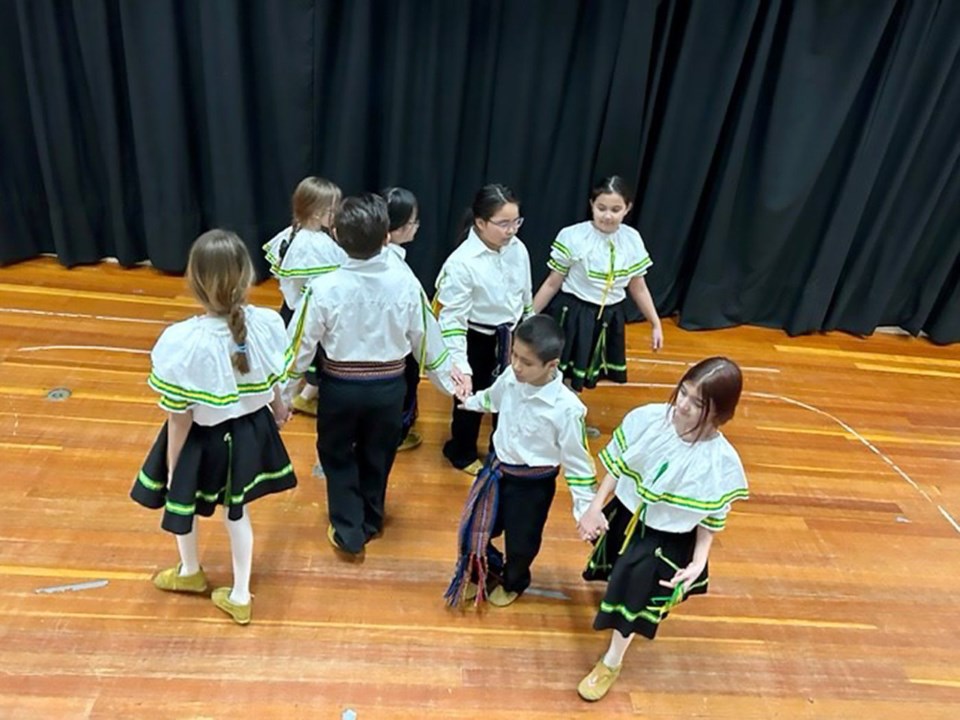PRINCE ALBERT — Ribbon skirt sewing classes, jigging groups, and culture camps are among the ways a Prince Albert elementary school is trying to decolonize the classroom.
Riverside School principal Leanne Tretiak said many traditional education tools, resources, and experiences are Eurocentric, and the school wants to change that.
“Well, looking at it and seeing (if) our children are represented in these resources,” Tretiak said. “Do they see themselves in their resources, in the stories we're reading, in the things we're doing? How do they see them in their current lives, in the culture that they're living right now in their day-to-day life, but also in their historic family?”
“We work hard to do that each day and embed it in what we do all the time. It is from the activities that we've planned for the kids of course and the learning experiences, but it's also looking at the resources we use,” she added.
Tretiak is in her fourth year at Riverside. She said the school’s strong staff helps to build a culture that thinks outside the box.
“We have an incredibly strong staff that's passionate,” she explained. “They are passionate about what they do … (and) I find that that brings a special kind of quality to the work that they do. I also have several staff who are very connected to their traditional culture and background heritage as well so that also helps us to decolonize education.”
Tretiak said they’ve also tried to expand the list of speakers who give school presentations as a way to increase students’ cultural knowledge.
“We try to find a person who can bring some traditional teachings with them, as well as being an expert in their field,” Tretiak said. “If we are looking at making connections in our community, who are our Indigenous partners that we might be able to partner with first as well as we can partner with other people, of course, we do.”
The school has built relationships with Elders, Knowledge Keepers and community groups. Tretiak said these relationships and the knowledge of their staff allow Riverside to celebrate and share Indigenous culture and teachings throughout their school.
She explained that the way they look at education is based on it being traditionally, in Canada, a colonizing system, but they could change that.
“We have a very strong responsibility to look at what we have been doing, where we've come historically in education, in Saskatchewan, and how can we do it better,” Tretiak said.
“I think we are starting as a society and, as Saskatchewan citizens and Canadian citizens, to really start questioning (things). (We are) looking at our laws, looking at our judicial system, looking at our health care system, looking at how we support people.
“We have a very Eurocentric lens for much of what we do in Canadian society, in how we function in Saskatchewan and how we function in Prince Albert and the surrounding area, because that's how historically they were built up,” she added.
Saskatchewan Rivers School Division, Riverside can access guidance from an Elders Council and staff specializing in Indigenous perspectives. They also use the Office of the Treaty Commissioner (OTC).
Schools like Riverside aren’t alone in their quest. Tretiak said there are key players and tables around the country working to make sure students get a broader cultural experience.
“That should be an inherent right,” Tretiak said. “It should be not just as the colonized Canadian society view.
“We need to know about each other,” she added. “We need … to be open and honest about our past and our history and where we've come from. If we don't know that, we don't know where we're going.”
In early May, the school hosted their Spring Gathering Cultural Camp which is one example of activities they do for decolonization.
“We have our staff who bring their gifts and talents and abilities and interests and that helps to drive a lot of the things that we do,” Tretiak said.
Some examples are Metis jigging and square dancing and a drumming group.
“We have a teacher who's passionate about that and has drum teachings and is wanting to share that with the children. Here at Riverside, we have a community drum so we can have our males drumming. Our females drumming and our two spirited kids drumming too. It is teaching drum.”
The school was also gifted a drum before her time at Riverside began. They also have seamstress teachers on staff to help facilitate making Ribbon Skirts and Ribbon Shirts.
“She does ribbon skirts and ribbon shirts with the kids every year through their practical Applied Arts curriculum,” Tretiak explained. “It's like taking the stuff that we do with kids through our curricula and (asking) how can we do that? Instead of just sewing pyjama bottoms, she has some sewing ribbon skirts and shirts. That’s an example of decolonizing education.”
The Saskatchewan Rivers School Division’s Elder’s Council, which has developed over the past few years is also a resource for Riverside.
“That has helped us connect with elders, which is something that we struggle to do in an urban setting,” she explained. “Elders are hard to access in that they are often older. there are not many of them, and many of them are supporting the work that they do in their home communities too.”




